Exporting to other finance systems
XML Files
We have two XML files which will be generated for the SAP interface from NEOSYS.
- Provisions XML File
- Invoices XML File
File Types
Provisions XML File
The Provisions XML file, when generated in particular month, contains:
- Provisions for all ads which have been booked but not yet invoiced until month end
- Reversals for ads which have booked and invoiced
- Reversals of all ads YTD (till last XML generation) which have been booked but not invoiced and Re-entry of the same as per first point
Each ad will have 2 lines and a sample entry is as follows:
P&L Provision Expense A/c (38131099) (40) DR B/S Provision Expense A/c (14424005) (50) CR
Reversals will be the opposite of the above.
Invoices XML File
This Invoices XML file when generated in a particular month contains:
- Entry of actual provision for the ads which are invoiced
- Entry of actual expense and supplier amount
- Reversal of actual provision created as per first point
Each ad will have a total of 6 lines and a sample entry will be as follows:
P&L Provision Expense A/c (38131099) (40) DR ------ Actual Provision B/S Provision Expense A/c (14424005) (50) CR
P&L Actual Expense A/c (38101001) (40) DR ------ Actual Expense Supplier A/c (503475) (31) CR
B/S Provision Expense A/c (14424005) (40) DR ------ Reversal of actual provision P&L Provision Expense A/c (38131099) (50) CR
Reversals/credit notes will be the opposite of the above.
Exporting XML Files using Finance Interface
Generation of XML files
The XML files can be generated by users having permissions to finance functions. It is available under Menu > Media > Diary > Finance Interface
Note the following points for usage of this screen:
- As stated above, the XML files have to be individually generated for Provisions and Invoices and an example of how the screen looks like is shown below.
- Once you are ready to generate the XML files for the month, click on the button Generate once each in the Provisions and Invoices column.
- The moment you click on either all the data is gathered and shown on the screen in an XML file.
- Clicking again on the generate button DOES NOT collect new data and only brings up the last file. Hence you need to interface the generated file and there is NO WAY to not accept it.
- After successful interfacing of both/either of the files into SAP, you need to sign off the interface by clicking on SIGN, to allow the next batch to be generated.
- If you do successive generations in a particular month for Provisions, you need to note that the later will create a reversals of the earlier provisions and re-enter the same as stated above in the Provisions XML file information
- You can get an Excel/HTML version of the output XML file by clicking on the LIST button in both the columns
- Clicking on the Crosstab button will get you a pivot report of the XML data interfaced
- Clicking on the Prior button in the crosstab section will generate the last XML file prior to the one you are going to sign off, besides getting an Excel/HTML output and Crosstab report of the same
- Clicking on the YTD button in the crosstab section will generate the YTD information of all the XML files in a single file, besides getting an Excel/HTML output and Crosstab report of the same (Invoices does not give a cross tab for YTD).
- The Crosstab section allows you to add additional rows of the information you want to display.
- In the Crosstab columns section it is best to select A/c No to get a good overview of the figures and likewise it is best to select Both for Dr/Cr.
Procedure to generate Provisions XML file
- Login to NEOSYS
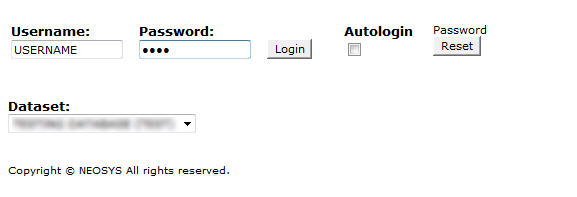
- Go to Menu > Media > Diary and click on Finance Interface (Keyboard shortcuts instead of mouse - Alt+M, M, D, I):
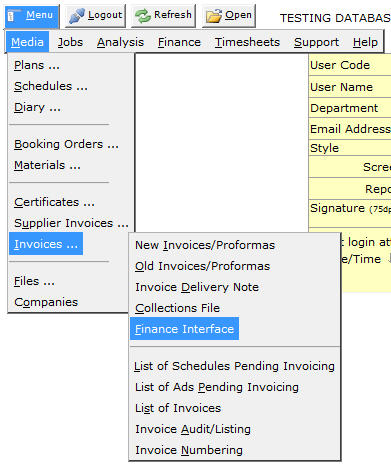
- Click on Latest in the Crosstab and thereafter click on Generate under Provisions:
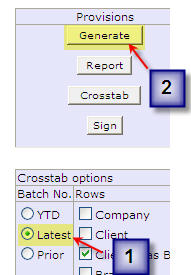
You will now get an XML file output in a new window – click on File, Save As: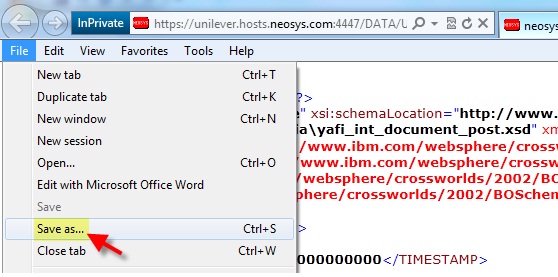
Ideally you need to have a folder to store all your XML files and it is better you have a sub-folder for the month/period as shown below:
a. Create/select the relevant folder for the period
b. Type in the file name “neosys provisions interface” or anything else acceptable to the SAP IT
c. Click on Save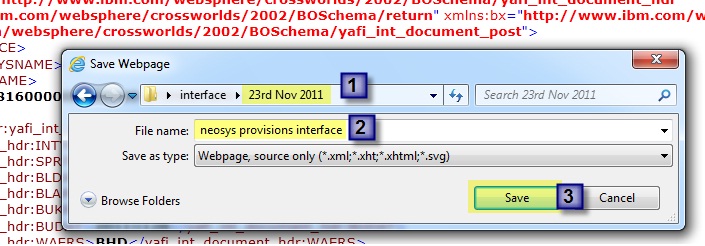
The file now can be emailed / sent to the SAP IT for interfacing. - You can now close the XML file and go back to the original Finance Interface Screen.
- You can now generate an Excel/HTML version of the Provisions XML file by clicking as follows:
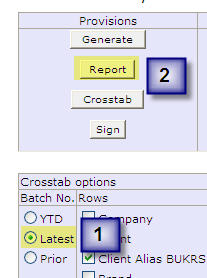
An output as follows will appear – you can copy the table to excel from here or click on the EDIT button in your IE to edit it in Excel.
- To get a pivot table of the same for the Provisions XML file, you can use the following options – however you can select more rows from the options shown:
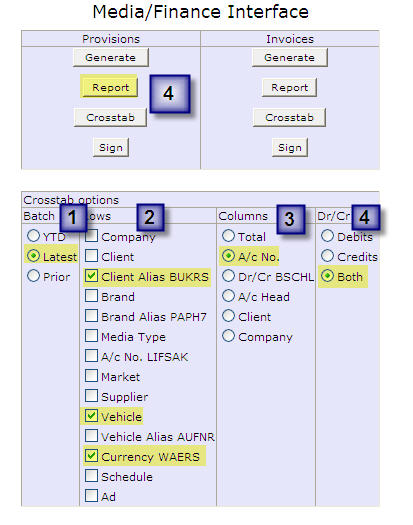
After clicking on generate you will get a report similar to this: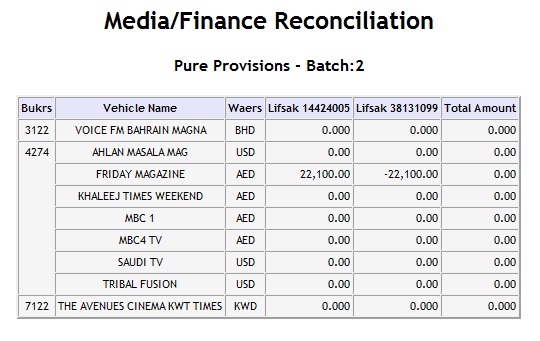
- After confirmation from SAP IT that the file has been interfaced and you have confirmed the figures, you need to sign off the Provisions XML file generated so that the system can generate the next output

Procedure to generate Invoice XML file
1) Login to NEOSYS
2) Go to Menu > Media > Diary and click on Finance Interface (Keyboard shortcuts instead of mouse - Alt+M, M, D, I):
3) Click on Latest in the Crosstab and thereafter click on Generate on the Invoices tab:
You will now get an XML file output in a new window – click on File, Save As:
Ideally you need to have a folder to store all your XML files and it is better you have a sub-folder for the month/period as shown below.
4) Create/select the relevant folder for the period 5) Type in the file name “neosys invoices interface” or anything else acceptable to the SAP IT 6) Click on Save
The file now can be emailed / sent to the SAP IT for interfacing.
4) You can now close the XML file and go back to the original Finance Interface Screen.
5) You can now generate an Excel/HTML version of the Invoices XML file by clicking as follows:
An output as follows will appear – you can copy the table to excel from here or click on the EDIT button in your IE to edit it in Excel.
6) To get a pivot table of the same for the Invoices XML file, you can use the following options – however you can select more rows from the options shown:
After clicking on generate you will get a report similar to this:
7) After confirmation from SAP IT that the file has been interfaced and you have confirmed the figures, you need to sign off the Invoices XML file generated so that the system can generate the next output: